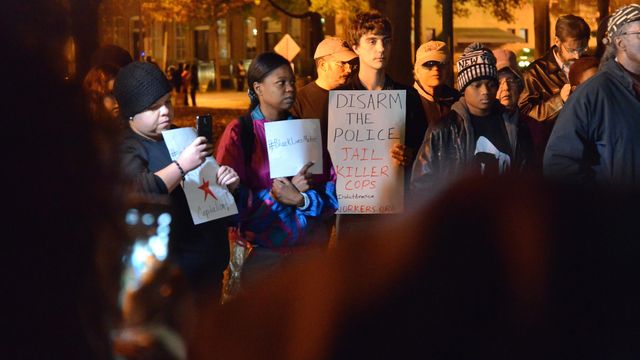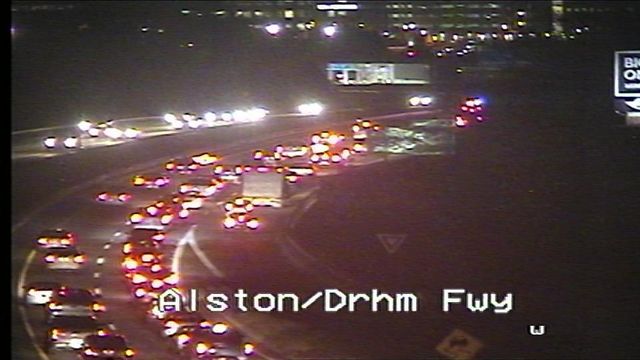Ferguson protesters voice frustrations across Triangle, block Durham Freeway
Across central North Carolina and around the country, people of various backgrounds and faiths gathered Tuesday night in response to a grand jury's decision not to indict a Ferguson, Mo. police officer in the shooting death of an 18-year-old man - including a crowd that blocked a major Triangle highway.
Posted — UpdatedA group of about 20 Ferguson protesters briefly blocked the northbound lanes of the Durham Freeway at Mangum Street at about 6:30 p.m., bringing rush hour traffic to a stop.
The group chanted "no justice, no peace" while holding signs and banging a drum. One sign read "Cops are liars." Some of the protesters stood while others lay flat on the roadway.
A video posted on YouTube showed the protesters on the highway:
Rodrigo Dorfman, a Durham filmmaker who recorded the protests, saw the traffic disruption as a way to "interrupt the system."
"Anger takes over, but then again, marching is a sign of hopefulness not hopelessness," he said. "If people want to shut down a highway, that’s how they are expressing it. If they want to burn something down, that’s how they're expressing it. It’s a continuum."
The group then marched to Durham Police Department headquarters, where dozens of officers stood outside the building in riot gear. The group chanted at officers, but no clashes were reported.
Afterwards, the crowd convened in CCB Plaza in downtown Durham, where they were joined by about 300 people who first went to the Durham County jail "to talk to the incarcerated folks, to hold them in their hearts and tell them that they are there to support them," Dorfman said.
One person spray painted "Burn the prisons" on a wall outside the Durham jail.
At CCB Plaza, some vented their frustration through painting. Others shared poetry and music.
Toni Oliver, a N.C. Central University senior, said the event was a testament to Durham's character – but hopes the response isn't a fad.
"I hope people aren’t just excited about it today because (the grand jury decision) happened yesterday," she said.
Violent protests erupted in Ferguson Monday night after a grand jury chose not to indict Darren Wilson for the August shooting death of Michael Brown. Despite calls for calm from President Barack Obama, as well as from political and law enforcement leaders in Missouri, protesters in the St. Louis suburb set cars on fire and burned businesses to the ground. Police made dozens of arrests.
Obama described the violence as "criminal acts" and "destructive" during an immigration speech in Chicago Tuesday afternoon.
"The frustrations that we’ve seen are not just about a particular incident," he said. "They have deep roots in many communities of color who have a sense that our laws are not always being enforced uniformly or fairly. That may not be true everywhere, and it's certainly not true for the vast majority of law enforcement officials, but that's an impression that folks have and it's not just made up. It's rooted in realities that have existed in this country for a long time."
Mostly peaceful protests took place in cities across the country Tuesday, including some that disrupted traffic:
- In Cleveland, dozens of protesters chanting “no prisons no cops, the violence must stop” stopped traffic on a highway. They also chanted “justice for Tamir,” referring to a 12-year-old boy who was recently shot and killed by a Cleveland police officer.
- A large crowd blocked an entrance to the Lincoln Tunnel in New York City – some tried to march into the tunnel. Protesters also briefly shut down the Triborough and Brooklyn bridges, as well as blocked traffic in Times Square. One person was arrested for throwing fake blood on New York City Police Commissioner William Bratton.
- Hundreds of protesters blocked Interstate 44 in downtown St. Louis.
- Up to 2,000 protesters blocked streets in Seattle.
In Ferguson, Missouri Gov. Jay Nixon ordered more National Guard troops to the city to help quell any violence Tuesday night, bringing the number of troops in the area to 2,200. A large number of troops stood in front of Ferguson Police Department headquarters, which leaders described as "ground zero" for protesters.
Demonstrators threw rocks at Ferguson City Hall Tuesday night and tried to tip over a police car, then set it on fire. Officers responded to the area and fired smoke bombs. More arrests were made.
In Raleigh, hundreds peacefuly gathered in Moore Square to pray and share their frustrations:
- "I have 15-year-old and 10-year-old sons and I worry about them all the time," Erin Dayle-Byrd said. "Black men are an endangered species."
- "It is tearing me apart to see our children being killed like that," Eddie Jacobs said. "I am tired of it."
- "The only way I feel we can change is if we stick together and we produce actual ideas that create change," Lawrence Prickett said.
- "We don't know where we're going, but we know where we have been," Tyesha Williams said. "We are tired of being killed for the color of our skin."
- "We have to ban together and let them know we are no longer divided," Diana Powell said. "And it has to be more than a moment, it has to be a movement."
About 30 people gathered for a candlelight prayer vigil at Pullen Memorial Baptist Church.
in Chapel Hill, about 50 people gathered at the corner of Elliott Road and East Franklin Street and marched to the Orange County Courthouse near the University of North Carolina at Chapel Hill. The group shouted "hands up, don't shoot" and "no justice, no peace" while marching.
• Credits
Copyright 2024 by Capitol Broadcasting Company. All rights reserved. This material may not be published, broadcast, rewritten or redistributed.






